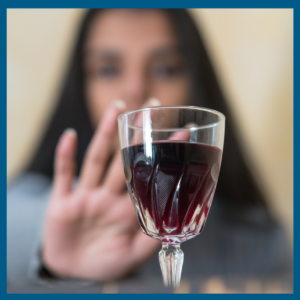Alcohol Use During the Holidays
Wine, beer, and liquor flows in excess during the festive season of holiday parties and new year celebrations. While many can limit their increased alcohol use to this time of year, the holidays create an even higher risk for those already struggling with substance use.
Whether it’s a company party, visiting friends, a family holiday, or New Years’ Eve, alcohol seems to be in abundance at all end-of-year events. While addiction is a disease, binge drinking is often used as an unhealthy coping tool for:
- Everyday stressors
- Mental illness
- Grief and loss
- Social anxiety
- Toxic family dynamics
- Work stress (including year-end sales goals, annual review, or preparing for PTO)
- Financial problems
For many, they are able to recognize when they’ve indulged too much at one party. And course-correct by easily abstaining or reducing at the next event. But for others, their regular struggle with substance use is easier to hide when others are also increasing their intake during the holidays. This can put their health and safety—and the safety of others—at a higher risk.
How Much is Too Much?
While it is well argued that any consumption of alcohol poses health risks, the most recent Dietary Guidelines for Americans says those who choose to drink alcohol should limit to one drink a day for women or two for men.
Even then, moderate alcohol use is not risk-free. Especially for those who are pregnant, take certain medications, have heart problems, have a family history of alcoholism, or plan to operate a car or machinery.

Reducing Alcohol Use During the Holidays
If you find yourself consuming too much alcohol, begin by identifying the triggers that encourage you to drink. Prepare a plan for how you will respond, reduce, or avoid those triggers. (An EAP Counselor can help you!)
- External triggers are specific situations, people, or times of day that encourage drinking.
- Internal triggers are more difficult to define but can include fleeting thoughts of a relaxing drink. Or emotions such as excitement, celebration, frustration, anxiety, or nervousness.
Additionally, the following tips can help you reduce or abstain from drinking:
- Alternate which parties you will drink at and which you will not. For example, avoid drinking at your company party but choose to drink on Christmas Day at home with your family.
- Use the fancy glassware, but fill it with a festive non-alcoholic drink. Such as, flavored seltzer water in a wine glass with a slice of fresh fruit.
- Commit to drinking a glass of water after each adult beverage.
- Volunteer to be the designated driver to prevent yourself from drinking.
- Switch your focus to how you want to feel and make choices that improve your health.
- Start the first day of the new year without a hangover by enjoying fun foods—not drinks—on New Years Eve.
- Challenge yourself to a “Dry January” where you stay sober all 31 days of the month.
When is it Alcohol Use Disorder? According to NIH.gov, alcohol use disorder (AUD) is a medical condition characterized by an impaired ability to stop or control alcohol use despite adverse social, occupational, or health consequences. It encompasses the conditions that some people refer to as alcohol abuse, alcohol dependence, alcohol addiction, and the colloquial term, alcoholism. Considered a brain disorder, AUD can be mild, moderate, or severe.
How Your EAP Can Help
Your EAP isn’t just for those who are struggling with addiction and/or alcohol use disorder. EAPs can also be used for early intervention and prevention. Such as helping you create healthier coping skills, better understand your triggers, learn mindfulness, and develop a motivational plan to reduce social drinking.
A comprehensive EAP like Carebridge offers a full spectrum of resources. Including life coaches to help you make positive changes in your life. As well as mental health counselors to help you find inpatient or outpatient addiction recovery programs, support groups, counseling, and more. If you’re a current member of Carebridge EAP, call 800.437.0911 to get started.